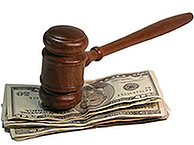When Can a Taxing Unit File a Delinquent Tax Suit?
Section 33.41 of the Texas Tax code states that any time after its tax on property becomes delinquent, a taxing unit may file lawsuit to foreclose the lien securing payment of the tax, to enforce personal liability for the tax, or both. The suit must be in a court of competent jurisdiction for the county in which the tax was imposed. Each owner who owns taxable property on January 1 is liable for all taxes due on the property for that year. This means that an owner who owned taxable property on January 1 can be sued personally for delinquent taxes on a property, even if the property has been sold or transferred since then.
While the taxing unit's last resort is taking a delinquent property owner to court, a delinquent tax suit can lead to a judgment foreclosing the tax lien and authorizing the sheriff to seize the property and sell it at public auction.
Who Files the Delinquent Property Tax Suit?
Tax Assessors normally contract with a law firm to manage the legal proceedings involved in the collection of past due taxes. While each taxing jurisdiction unit has the option to select their own attorney, most jurisdictions in the county consolidate the legal collections with one or two law firms. In Texas, there are more than forty law firms in the property tax collection business; however, the law firms of Linebarger Goggan Blair & Sampson and Perdue Brandon Fielder Collins & Mott‚ LLP representing the largest contracting firms.
What are the Costs Associated with a Delinquent Property Tax Lawsuit?
In addition to the penalties and interest prescribed under section 33.01 and 33.07 of the Tax Code, the filing of a tax suit will result in additional litigation costs to the property owner. The costs can vary widely from a few hundred dollars to several thousand. While not exhaustive, we typically see one or more of the following fees in a tax suit – district court costs, abstract/title fees, citation fees, writ enforcement fees, publication fees, and sheriff’s commissions.
Can a Property Tax Loan Help?
Yes, a property tax loan can pay all past due taxes, collection fees, and litigation costs with no out of pocket expense to the property owner. With easy qualifications, a property tax loan can solve your past due property tax problem in a matter of days. If you’d like a no obligation consultation, please call one of our licensed loan officers at 877-776-7391 or apply online.
